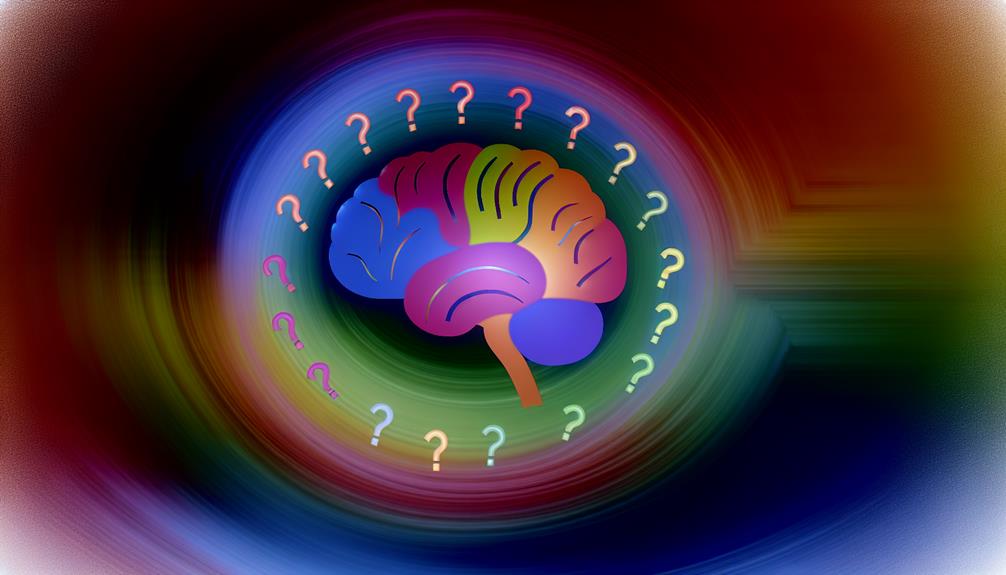Did you know that approximately 2.8% of adults in the U.S. are diagnosed with bipolar disorder at some point in their lives? If you've ever found yourself questioning your mood swings or energy levels, you might be considering whether this self-assessment tool could provide clarity. The "Am I Bipolar Quiz" can serve as a starting point for understanding your emotional patterns, but it raises important questions about what to do with your results. So, what steps should you take next if your answers raise some concerns?
Contents
Understanding Bipolar Disorder

Understanding bipolar disorder is fundamental for anyone grappling with its complexities. This mental health condition is often misunderstood, leading to the spread of bipolar myths that can hinder individuals from seeking help or receiving proper support. You might've heard that bipolar disorder only causes extreme mood swings or that people with the condition are dangerous. These misconceptions contribute to a stigma that affects those who live with bipolar disorder, isolating them from friends, family, and communities.
Bipolar disorder is more than just mood fluctuations; it's a serious mental health issue characterized by episodes of mania, hypomania, and depression. Each person experiences it differently, which can further complicate understanding. By promoting stigma awareness, we can create a more supportive environment for those affected. It's important to recognize that bipolar disorder doesn't define a person; it's just one aspect of their life.
When you educate yourself about this condition, you empower not only yourself but also those around you. Understanding the realities of bipolar disorder helps dismantle harmful stereotypes. It's essential to engage in conversations that focus on empathy, support, and factual information rather than fear and misunderstanding.
Common Symptoms to Consider
If you're wondering about bipolar disorder, it's important to recognize common symptoms that can greatly affect your daily life. Mood swings, characterized by intense highs and lows, often accompany changes in energy levels, which can leave you feeling either hyperactive or fatigued. Understanding these symptoms can help you better assess your experiences and seek appropriate support.
Mood Swings Overview
Mood swings can feel like riding a rollercoaster, with emotional highs and lows that can leave you feeling drained and confused. Understanding your mood fluctuation patterns is vital, as it can help you identify potential emotional triggers that contribute to these changes. Here are three common symptoms to take into account:
- Extreme Emotional States: You might experience intense feelings of happiness or irritability that seem disproportionate to the situation at hand. These highs can quickly shift to deep sadness or frustration.
- Rapid Changes: Mood swings might occur suddenly and without clear cause. One moment you're excited about a project, and the next, you feel hopeless or overwhelmed.
- Difficulty Regulating Emotions: You may struggle to manage your feelings, leading to outbursts or withdrawal. This inconsistency can affect your relationships and daily life.
Recognizing these symptoms is the first step toward understanding your emotional landscape. If you find that your mood swings notably impact your life, it might be worth discussing your experiences with a mental health professional. They can provide insights and tools to help you navigate these challenges effectively.
Energy Level Changes
Experiencing fluctuations in energy levels is another common symptom that can accompany mood swings. You might find yourself feeling unusually energetic and motivated one moment, only to feel lethargic and drained shortly after. These energy fluctuations can be quite pronounced, making it challenging to maintain a consistent routine or focus on daily tasks.
During periods of high energy, you may notice an increase in emotional intensity—feeling euphoric, enthusiastic, or even overly confident. This heightened state can lead to impulsive decisions and a sense of invincibility. Conversely, when your energy dips, you might feel overwhelmed by sadness, irritability, or hopelessness, which can be equally as distressing.
It's important to recognize that these changes in energy levels aren't just about feeling tired or alert. They can greatly impact your overall emotional well-being and daily functioning. If you've noticed a pattern of these fluctuations, it could be helpful to discuss your experiences with a mental health professional. Understanding the connection between energy levels and mood can provide clarity and guide you toward effective coping strategies.
The Purpose of the Quiz

The purpose of the quiz is to help you better understand bipolar disorder and how it may affect your life. By engaging in self-assessment, you're taking an important step toward recognizing your symptoms and seeking the appropriate support. This process can empower you with insight, guiding you toward informed decisions about your mental health.
Understanding Bipolar Disorder
Bipolar disorder can feel like a rollercoaster, with its unpredictable highs and lows impacting daily life. Understanding this condition is essential, as it's often surrounded by misconceptions and bipolar myths. Recognizing the facts can help you navigate the diagnosis process more effectively.
Here are three key points to reflect on:
- Mood Episodes: Bipolar disorder is characterized by distinct mood episodes, including manic, hypomanic, and depressive states. These episodes can vary in duration and intensity, affecting your mood and behavior considerably.
- Diagnosis Process: Getting a proper diagnosis involves a thorough evaluation by a mental health professional. They'll take into account your symptoms, personal history, and any family history of mood disorders.
- Treatment Options: While there's no cure, effective treatment plans often combine therapy, medication, and lifestyle changes. Understanding your condition can empower you to make informed decisions about your mental health.
Self-Assessment Benefits
Managing the complexities of mental health can be challenging, but self-assessment tools like the "Am I Bipolar Quiz" can provide valuable insights. Engaging in this quiz helps you gain a clearer understanding of your emotional landscape, fostering emotional awareness. By reflecting on your moods and behaviors, you open the door to self-reflection benefits that can lead to a more informed perspective on your mental health.
Taking the time to explore your feelings through this quiz allows you to identify patterns that may indicate bipolar disorder or other mood-related issues. This process is not about labeling or diagnosing yourself; rather, it's a step towards self-discovery. Understanding your emotional highs and lows equips you with the knowledge to seek appropriate help when needed.
Moreover, self-assessment encourages you to become proactive about your mental well-being. It can empower you to communicate more effectively with healthcare professionals, enhancing your treatment experience. Ultimately, the insights gained from the "Am I Bipolar Quiz" can guide you toward healthier coping strategies, fostering a deeper connection with your emotional well-being and improving your overall quality of life.
How to Take the Quiz
Taking the quiz can feel like a significant step toward understanding your mental health. It's important to approach it thoughtfully and honestly, as your responses can provide valuable insights. Here's how to take the quiz effectively:
- Read the quiz instructions carefully: Before you start, make sure you understand what's being asked. The quiz instructions will guide you through the format and clarify how each question relates to your experiences.
- Choose a quiet environment: Find a peaceful space where you can focus without distractions. This will help you reflect on each question more deeply and answer truthfully.
- Be honest with yourself: It's imperative to answer each question as accurately as possible. The quiz format encourages you to reflect on your feelings and behaviors over a specific period, so be genuine in your responses.
Once you've completed the quiz, take a moment to review your answers. Remember, this quiz is a tool for self-reflection, not a definitive diagnosis. It's designed to help you gather information about your mental health, which can be a helpful starting point for discussions with a mental health professional. Taking this step is commendable, and acknowledging your feelings is significant in the journey toward understanding your mental health better.
Interpreting Your Results
Once you've received your results, it can be both enlightening and overwhelming to process what they mean. You might find yourself questioning your emotions or behaviors, and that's completely normal. It's important to remember that this quiz is just a starting point, not a definitive diagnosis. Many bipolar myths exist that can cloud your understanding, such as the belief that bipolar disorder is only about mood swings. In reality, it's a complex condition involving emotional regulation, where individuals can experience extreme highs (mania) and lows (depression).
As you interpret your results, look for patterns in your emotional experiences. Do you find that your moods shift dramatically, or do you struggle with regulating your emotions? Understanding these patterns can help clarify whether your experiences align with bipolar disorder or another issue. It's also essential to reflect on the impact your emotions have on your daily life. If your moods disrupt relationships, work, or general well-being, it might signal a need for further exploration.
Keep in mind that self-assessment tools like this quiz can provide insight, but they should not replace professional evaluation. If your results resonate with you, think about discussing them with a mental health professional who can provide a more thorough assessment. Remember, seeking help is a sign of strength, and understanding your emotional landscape is a significant step toward finding balance.
When to Seek Professional Help
Recognizing when to seek professional help is essential for anyone grappling with emotional challenges. If you're experiencing significant mood swings, it's important to pay attention to the warning signs that might indicate a need for support. Seeking help early can lead to better treatment options and improved quality of life.
Here are three key indicators that it's time to reach out to a professional:
- Persistent Mood Changes: If you notice that your mood swings are becoming more frequent or intense—shifting from hopelessness to exhilaration—it may be a sign that you need professional guidance.
- Impact on Daily Life: When your emotional state starts interfering with your work, relationships, or daily activities, it's vital to reflect on seeking help. Difficulty maintaining responsibilities is a clear warning sign that you're not coping well.
- Physical Symptoms: Emotional distress can manifest physically. If you're experiencing unexplained fatigue, insomnia, or changes in appetite alongside your mood swings, it's time to consult a healthcare provider.
Resources for Further Support

Finding the right support can make a significant difference in managing your emotional well-being. If you suspect you might be bipolar, exploring various resources is essential. Support groups provide a safe space where you can connect with others who understand your experiences. Sharing your journey can foster a sense of community and reduce feelings of isolation.
Online resources are also invaluable. Websites dedicated to mental health often offer educational materials that explain bipolar disorder, its symptoms, and treatment options. Many of these platforms include forums or chat rooms where you can engage with others facing similar challenges. Engaging with these communities can help you learn coping strategies that others have found effective.
Therapy options are vital for managing bipolar disorder. Various types of therapy, including cognitive-behavioral therapy, can provide you with tools to navigate your emotions and reactions. If you're in crisis, don't hesitate to reach out for crisis intervention services. These professionals can guide you through tough times and help you find immediate support.
Additionally, community outreach programs often provide workshops and resources tailored to those dealing with mental health issues. These initiatives can connect you to local services and foster a deeper understanding of your mental health.
Frequently Asked Questions
Can the Quiz Diagnose Bipolar Disorder?
While a quiz can provide insights into your mental health, it can't diagnose bipolar disorder. The accuracy of such quizzes varies; consulting a mental health professional is essential for an accurate evaluation and support.
Is the Quiz Suitable for Children or Teens?
When considering age appropriateness, it's essential to guarantee children or teens have the emotional understanding necessary to interpret quiz results. You should consult a mental health professional for guidance tailored to their developmental stage.
How Often Should I Take the Quiz?
Research shows that 1 in 5 people experience mood disorders. For effective mood tracking, consider taking the quiz monthly. This frequency helps you notice patterns and changes in your mood over time, aiding self-awareness.
Are There Any Costs Associated With Taking the Quiz?
There typically aren't any costs associated with mental health quizzes, including accessibility options. You can find many free resources online. It's important to prioritize your mental health and utilize these tools without financial concerns.
Imagine a garden where blossoms reveal secrets. You can share your quiz results, but consider privacy concerns. Opening up can foster connection, yet guarantee you're comfortable with who knows the personal truths behind those petals.
Conclusion
In traversing the emotional landscape of life, recognizing the signs of bipolar disorder can feel like finding your way through a dense fog. The "Am I Bipolar Quiz" offers a lantern to illuminate potential patterns in your feelings. While it's not a substitute for professional diagnosis, it's a valuable step toward understanding yourself better. If you find yourself resonating with the symptoms, don't hesitate to reach out for help—after all, even the brightest stars need guidance to shine their best.
